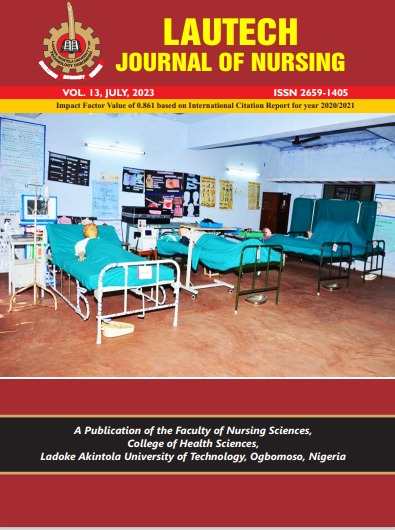Dysmenorrhea is pain associated with menstruation which is a public health problem affecting young females of reproductive age which can be managed pharmacologically and/or non-pharmacologically. The study aimed at assessing the prevalence, perceived effects and coping strategies of dysmenorrhea among female nursing students of University of Nigeria, Enugu campus (UNEC), Enugu State, Nigeria. A cross-sectional descriptive survey design was employed in this study with a sample size of 268 respondents.Datawas obtained using a structured questionnaire. The analysis was done using
the Statistical Package for the Social Sciences (SPSS) version 25 and Microsoft Excel 2016. Findings indicate that dysmenorrhea is highly prevalent among female nursing students of UNEC (77%). This study further revealed that the symptoms manifested by respondents during dysmenorrhea include experiencing pain mainly during menstruation (60.9%), the type of pain is intermittent (70.5%) and moderate in the lower abdomen (82.6%). Other associated symptoms experienced by the respondents are Dyspareunia (55.8%) and Stomach upset (54.7%). Findings also observed that the coping strategies used in the management of dysmenorrhea were majorly pharmacologic and non- pharmacologic strategies (48.3%). Three major non-pharmacologic strategies used to cope with dysmenorrhea were rest & sleep (59.9%), hot shower/bath (32.9%) and heat application, (28.5%) also, Felden/Felvin (27.1%) and Panadol/Paracetamol (18.4%) were the most commonly used medications in the management of dysmenorrhea. Lastly, medications are being taken based on the severity ofthe pain (76.5%), 1-2 times per day (53.9%) The result of this study observed that the major perceived academic effects of dysmenorrhea were lack of concentration at lectures (62.8%), social withdrawal (56.5%) and disturbed sleep (55.6%). Itis recommended that healthcare professionals
should encourage students to seek prompt medical attention to rule out or treat any underlying problem that may be responsible for dysmenorrhea in order that their reproductive health is not significantly affected later in life
- EDEH | LOVE | NNENE | lovenens001@gmail.com | +234, AGBA | MATHIAS | . | mathiasagba@gmail.com | +234, OSUALA | EUNICE | . | euniceosuala@gmail.com | +234, ONORIKPORI | TIMOTHY | . | onostim@gmail.com | +234, INGWU | JUSTIN | AGORYE | justin.ingwu@unn.edu.ng | +234
- Dysmenorrhea; Prevalence; Perceived effects; Coping strategies; Female nursing students.
- LOVE NNENE EDEH MATHIAS AGBA EUNICE OSUALA TIMOTHY ONORIKPORI JUSTIN AGORYE INGWU


